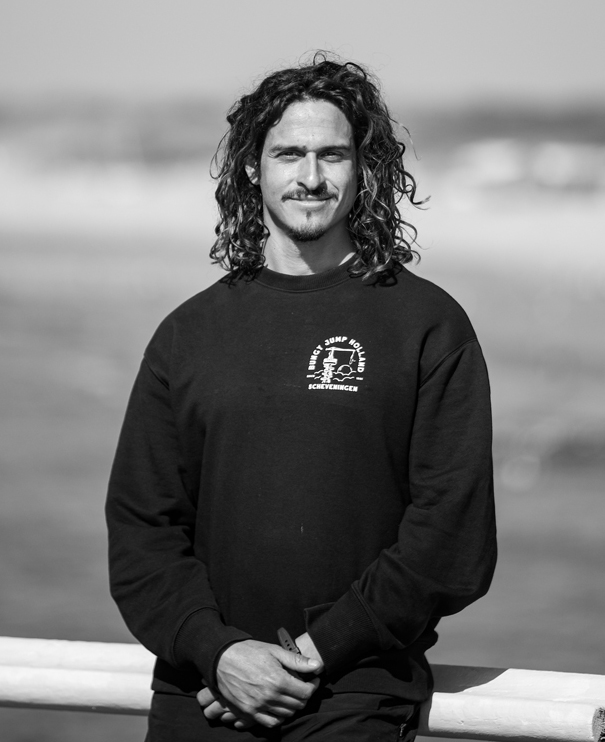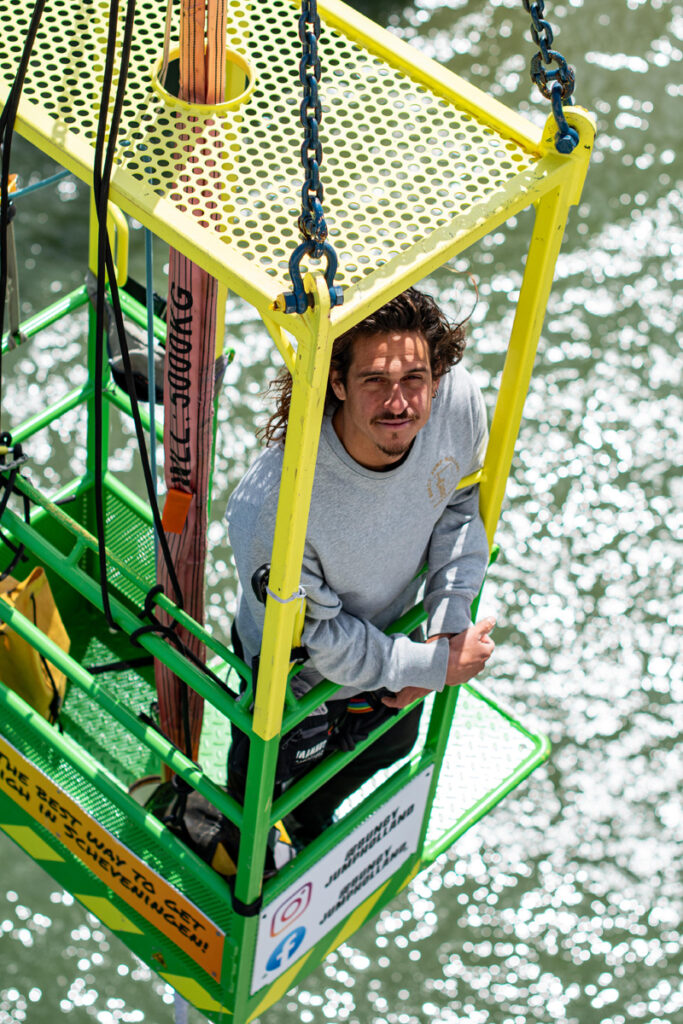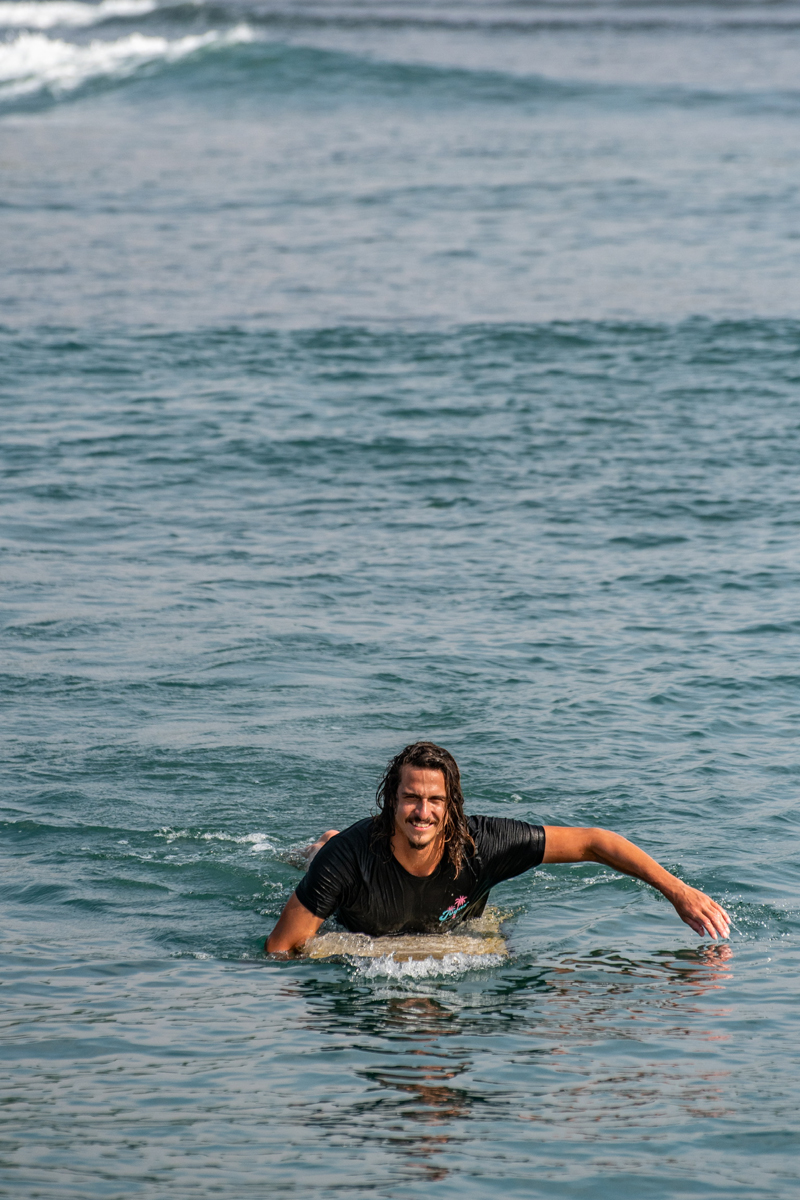 I was born and raised with my older sister on the Caribbean island of Aruba — a Dutch Overseas Country and Territory. I have happy memories of playing in the ocean as a child, surrounded by a big family of fishermen, and I loved going out to sea with them. However, my parents were quite strict and protective, and the home environment frequently felt oppressive. I often felt like my wings were clipped whenever I wanted to explore or be myself. I’d withdraw in silent frustration, isolating myself in suppressed anger. The idea of escape was always on my mind. Sometimes I’d run to the sea to let off steam, jumping in fully clothed. The water and the endless horizon calmed my spirit, helping my thoughts dissolve. I’d feel better for a while, only to return home and find the cycle beginning again. Aruba was a small paradise — but it felt like being a goldfish in a gilded bowl, with no clear exit and no space to grow.
I was born and raised with my older sister on the Caribbean island of Aruba — a Dutch Overseas Country and Territory. I have happy memories of playing in the ocean as a child, surrounded by a big family of fishermen, and I loved going out to sea with them. However, my parents were quite strict and protective, and the home environment frequently felt oppressive. I often felt like my wings were clipped whenever I wanted to explore or be myself. I’d withdraw in silent frustration, isolating myself in suppressed anger. The idea of escape was always on my mind. Sometimes I’d run to the sea to let off steam, jumping in fully clothed. The water and the endless horizon calmed my spirit, helping my thoughts dissolve. I’d feel better for a while, only to return home and find the cycle beginning again. Aruba was a small paradise — but it felt like being a goldfish in a gilded bowl, with no clear exit and no space to grow.
Finally, at 19, I determined to choose my own path. So in 2008, I left Aruba for the Netherlands with nothing more than a suitcase and finished my education there. As part of my aviation university course, I went to South Africa to write my thesis — and that’s where I fell in love with bungee jumping. After my first jump there, I couldn’t stop thinking about starting my own bungee company someday. Then, as luck would have it, I was sitting in a café in the Netherlands writing my thesis when I overheard a job interview for an extreme sports facility happening right next to me. I couldn’t wait for it to finish. As soon as it did, I jumped up, walked over, and with a shaky voice said, “You need me to work at the bungee.” I ended up joining the team led by the owner – a Dutch man called Steef — and the rest, as they say, is history.
 I love working for Steef. He’s encouraged me to face my inner demons in the same way he has done himself – so he really understands. First of all I tried a two-part course in the Netherlands and did some one to one therapy. Both of these helped to some extent – they allowed me to remove some layers – but neither enabled me to make long-term change and eventually I felt at rock bottom.
I love working for Steef. He’s encouraged me to face my inner demons in the same way he has done himself – so he really understands. First of all I tried a two-part course in the Netherlands and did some one to one therapy. Both of these helped to some extent – they allowed me to remove some layers – but neither enabled me to make long-term change and eventually I felt at rock bottom.
Eventually, Steef — who had done the Hoffman Process in 2015 — encouraged me to do it too. I felt hopeless but also curious. I figured nothing the course could make me feel would be worse than how I was already feeling. Still, I was tormented by the idea that I might be the one person Hoffman couldn’t help. Filling out the long pre-course materials took me on a rollercoaster — it already started releasing a lot of anger, a desire to withdraw, and the urge to escape. As the course date approached, I felt incredibly nervous. If just the pre-course work had that effect, what would the Process itself do? But the support I received from the enrolment team and office staff was incredibly warm and grounding; it helped shift my nerves into excitement.
The Process really surprised me. In some ways, it was similar to the other course I’d done, but this time I was able to take off the mask I didn’t even know I was wearing, the one I wore because I was worried about what others thought of me. I could finally be myself and express my emotions authentically while still feeling safe. It was intense but deeply rewarding. Since doing the Process, I’m more open and less afraid to show how I really feel. I still get the impulse to withdraw when I’m anxious, but now I have tools to work with it instead of shutting down. That’s brought me closer, more loving relationships, especially with myself.
It’s also made a huge difference at work. Before, I’d just say “everything’s fine” because I thought, as a manager, I had to always be in control. But now I see how both of my parents had patterns of pretending everything was fine while hiding pain or difficult emotions.
 This became very clear when my mother came to visit a few months after the course. I could feel my old patterns creeping back, and I saw many of them mirrored in her behaviour. So this time, when she said she was fine, I gently said, ‘Mum, I don’t think you’re fine — let’s be honest.’ After doing the Masterpiece (something you experience during the Process), we ended up having the deepest conversation we’ve ever had. She opened up about her childhood and shared things I’d never known. We both forgave each other for the past, and our relationship changed, for the better.
This became very clear when my mother came to visit a few months after the course. I could feel my old patterns creeping back, and I saw many of them mirrored in her behaviour. So this time, when she said she was fine, I gently said, ‘Mum, I don’t think you’re fine — let’s be honest.’ After doing the Masterpiece (something you experience during the Process), we ended up having the deepest conversation we’ve ever had. She opened up about her childhood and shared things I’d never known. We both forgave each other for the past, and our relationship changed, for the better.
My girlfriend has noticed a shift too; she says I’m calmer, less reactive, and more present. My colleagues say I seem happier and that there’s a new spark in me. It’s like life has regained its colour. And because Steef also did the Process, we now share an emotional vocabulary and a profound experience that’s deepened our conversations. We definitely don’t just say ‘I’m fine’ to each other anymore.
I’d say the rage and frustration that had been my constant companions have dropped by about 70–80%. I realised that was a pattern I inherited from my father — as kids, we always walked on eggshells around him. It feels strange not to hear that angry voice in my head anymore — I can barely feel it in my body either. And now, when something does trigger that old rage, I use the Hoffman tools instead of spiralling into self-doubt like I used to.
Toward the end of the Process, you’re asked to envision the future you want to create. I saw a version of myself that was more self-loving, accepting, and authentic. I wanted to leave the old me behind. For me, it wasn’t so much about changing the outside world — it was about shifting my inner world. But they say that if you change on the inside first, the outside will follow. And that’s been true. My girlfriend and I are closer than ever, and we’ve just bought our first house — close to the sea, because I can never be too far from water.
Every day at work, I help people face their fears on the zip wire or bungee jump — many of them are there for more than just the adrenaline. They come seeking a kind of breakthrough. Now, I can listen to and connect with their stories on a much deeper level. I understand what it means to dig deep, find the courage you didn’t know you had, and take a real leap of faith. Behind every fear, there’s a great opportunity.
Find out more about bungee jumping and extreme sports at: bungy.nl





 Sign up to receive monthly newsletters from Hoffman
Sign up to receive monthly newsletters from Hoffman